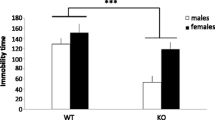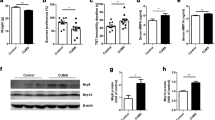We studied the effect of soluble factors derived from human macrophages polarized to M2 phenotype under conditions of serum deprivation (M2-SF) on behavioral pattern and cytokine production in various brain structures in mice with modeled stress-induced depression. Intranasal administration of M2-SF for 7 days led to stimulation of locomotor and exploratory activities and a decrease in emotional reactivity in the open-field test as well as reduction in depression-like behavior in Porsolt forced swimming test and a decrease in anxiety and anhedonia. Correction of depression-like behavior was accompanied by down-regulation of proinflammatory cytokines (IL-1β, IL-6, TNFα, and IFNγ) in pathogenetically important brain structures (striatum, hippocampus, and frontal cortex). These data indicate that the antidepressant potential of M2 type macrophages can be mediated by the anti-inflammatory effects of M2-SF.
Similar content being viewed by others
References
Markova E.V. Immune System and Higher Nervous Activity. Mechanisms of Neuroimmune Interactions in the implementation and Regulation of Behavioral Responses. Saarbrücken, 2012. Russian.
Chernykh ER, Shevela EY, Ostanin AA. The role of macrophages in damage recovery of central nervous system: new options for treatment of neurological disorder. Med. Immunol. 2017;19(1):7-18. https://doi.org/10.15789/1563-0625-2017-1-7-18. Russian.
Ambrée O, Ruland C, Scheu S, Arolt V, Alferink J. Alterations of the innate immune system in susceptibility and resilience after ocial defeat stress. Front. Behav. Neurosci. 2018;12:141. https://doi.org/10.3389/fnbeh.2018.00141
Bhattacharya A, Drevets WC. Role of neuro-immunological factors in the pathophysiology of mood disorders: implications for novel therapeutics for treatment resistant depression. Curr. Top. Behav. Neurosci. 2017;31:339-356. https://doi.org/10.1007/7854_2016_43
Chernykh ER, Sakhno LV, Shevela EY, Tikhonova MA, Khonina NA, Ostanin AA. Phenotypic and functional changes of GM-CSF differentiated human macrophages following exposure to apoptotic neutrophils. Cell. Immunol. 2018;331:93-99. https://doi.org/10.1016/j.cellimm.2018.06.002
Derecki NC, Quinnies KM, Kipnis J. Alternatively activated myeloid (M2) cells enhance cognitive function in immune compromised mice. Brain Behav. Immun. 2011;25(3):379-385. https://doi.org/10.1016/j.bbi.2010.11.009
Devanney NA, Stewart AN, Gensel JC. Microglia and macrophage metabolism in CNS injury and disease: The role of immunometabolism in neurodegeneration and neurotrauma. Exp. Neurol. 2020;329:113310. https://doi.org/10.1016/j.expneurol.2020.113310
Felger JC. Role of inflammation in depression and treatment implications. Handb. Exp. Pharmacol. 2019;250:255-286. https://doi.org/10.1007/164_2018_166
Hollis F, Kabbaj M. Social defeat as an animal model for depression. ILAR J. 2014;55(2):221-232. https://doi.org/10.1093/ilar/ilu002
Huang X, Li Y, Fu M, Xin HB. Polarizing macrophages in vitro. Methods Mol. Biol. 2018;1784:119-126. https://doi.org/10.1007/978-1-4939-7837-3_12
Idova GV, Markova EV, Gevorgyan MM, Al’perina EL, Zhanaeva SY. Cytokine production by splenic cells in C57BL/6J mice with depression-like behavior depends on the duration of social stress. Bull. Exp. Biol. Med. 2018;164(5):645-649. https://doi.org/10.1007/s10517-018-4050-9
Miller AH, Raison CL. The role of inflammation in depression: from evolutionary imperative to modern treatment target. Nat. Rev. Immunol. 2016;16(1):22-34. https://doi.org/10.1038/nri.2015.5
Sakhno LV, Shevela EY, Tikhonova MA, Ostanin AA, Chernykh ER. The phenotypic and functional features of human M2 macrophages generated under low serum conditions. Scand. J. Immunol. 2016;83(2):151-159. https://doi.org/10.1111/sji.12401
Tang MM, Lin WJ, Pan YQ, Guan XT, Li YC. Hippocampal neurogenesis dysfunction linked to depressive-like behaviors in a neuroinflammation induced model of depression. Physiol. Behav. 2016;161:166-173. https://doi.org/10.1016/j.physbeh.2016.04.034
Walf AA, Frye CA. The use of the elevated plus maze as an assay of anxiety-related behavior in rodents. Nat. Protoc. 2007;2(2):322-328. https://doi.org/10.1038/nprot.2007.44
Author information
Authors and Affiliations
Corresponding author
Additional information
Translated from Byulleten’ Eksperimental’noi Biologii i Meditsiny, Vol. 172, No. 9, pp. 334-338, September, 2021
Rights and permissions
About this article
Cite this article
Markova, E.V., Shevela, E.Y., Knyazeva, M.A. et al. Effect of M2 Macrophage-Derived Soluble Factors on Behavioral Patterns and Cytokine Production in Various Brain Structures in Depression-Like Mice. Bull Exp Biol Med 172, 341–344 (2022). https://doi.org/10.1007/s10517-022-05389-3
Received:
Published:
Issue Date:
DOI: https://doi.org/10.1007/s10517-022-05389-3




